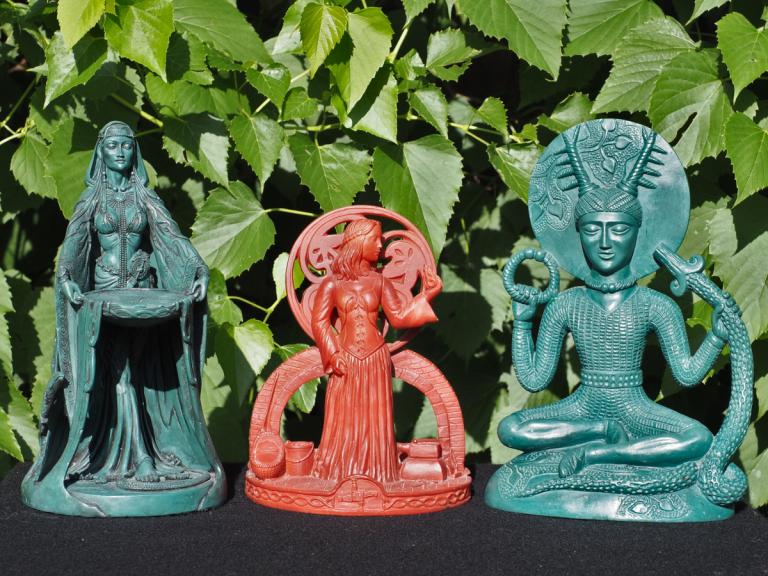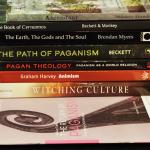Lately I’ve seen several social media posts asking people who believe in the Gods or in a God why they believe. Most are surprisingly respectful and seek to understand something they haven’t experienced for themselves. Some, of course, are disrespectful and seek only to mock people who refuse to sign on to atheistic materialism.
I’ve responded to some of the respectful ones, but at social media length. This is a deeper question and it deserves a deeper answer. And I want to begin with a key point.
Protestant Christianity is not normative of all religion
I understand why non-religious and semi-religious people talk so much about belief. The United States is not a Christian nation, but it is a nation dominated by Christianity in general and Protestant Christianity in particular. And Protestant Christianity places a supreme and inordinate emphasis on belief1. It says that the fate of your immortal soul depends on affirming the “right” set of supernatural propositions and rejecting all others.
Which particular supernatural propositions are considered “right” varies from sect to sect, but that’s another rant for another time.
So if you tell an average American that you belong to this religion or practice that religion, their first question is likely to be “what do you believe?”
That’s understandable, but this is not the most relevant question. For most people throughout most of history throughout most of the world, belief was and is of lesser concern. Instead, religion is primarily about what you do, who you are, and whose you are.
Buddhists don’t insist you believe anything about the Buddha. Judaism is perhaps the best example of religion being about whose you are and what that means. The shahada is one of the pillars of Islam, but only one of five. And many Pagans like to describe ourselves as “orthopraxic not orthodoxic” – right actions, not right beliefs.
It’s annoying when people complain about “religion” when what they’re really complaining about is Protestant Christianity.
Belief is not the most important part of my Paganism. But it is one part, and I’m happy to discuss what I believe and why.

What I mean by “belief”
Beliefs are things we think are true even though we cannot be certain they are true.
Some beliefs are about facts (are there are Gods or there are not Gods?) while other beliefs are about values (is altruism a good thing?). Everyone has beliefs, even if some people’s main belief is that we shouldn’t believe anything without conclusive evidence.
In 2019 I wrote A Pagan Creed For Non-Creedal Pagans to summarize my core beliefs. It includes the statement “I believe we must draw clear lines between what we know is true and what we believe is true, and we must accept the inherent uncertainty of religious questions.”
I have many beliefs about many different things. But when most people talk about belief, they’re talking about belief in Gods.
I believe because I believe
I’ve written at some length about my journey out of fundamentalism. But even when I realized I could not believe what I was told I had to believe about the Christian God, I never seriously considered becoming an atheist. Something deep inside me always whispered “there’s more.”
While religion is ultimately a choice – especially in contemporary Western culture, the most religiously diverse society in history – it has elements of orientation. At some level, some beliefs and even some practices (like prayer) are simply a part of who and what we are. How else can you explain how I ended up Pagan instead of the far more common and likely choice of becoming a liberal Christian?
This is uncomfortably close to the Calvinist concept of predestination. The difference is that Calvinists teach that “the elect” are predestined for heaven and everyone else is predestined for hell (which shows that the God of Calvinism is evil and must be opposed, but that’s yet another rant for another time). Meanwhile, religious orientation simply says that different people are best suited for different paths. Some paths may – or may not – be better than others, but there is no “one true path” and what matters most is what you do while you’re walking that path.
In any case, I believe in the Gods because I can’t not believe in the Gods.
I believe in the Gods because I’ve experienced the Gods
Perhaps if all I had was that internal orientation I would have gradually slipped into agnosticism. But I have more.
I have experience.
Some of that experience is quite commonplace. The feelings of wonder and awe in the immensities of Nature. The miracle of birth and the mysteries of death. The realization that every living thing – every person – on earth is related. This experience doesn’t demand that I believe anything about the Gods, but it does tell me that there’s more to life than what can be explained and measured.
Other experiences are more specific but hardly unique. Impressions during meditation. That whisper in the back of my head that’s not actually in my head that tells me something I had no way of knowing, but it turns out to be true. Messages that come often enough and consistently enough that I begin to recognize their source. These experiences were enough for me to build a Pagan and polytheist practice, to hold loosely but practice deeply.
And then there are the first-hand ecstatic experiences of Cernunnos, of the Morrigan, and of a few others that are among the most real things in my life. In the moment there was no doubt in my mind and soul exactly what this was. Who this was. After it was over, skepticism started creeping in. But this has happened enough times it’s easier for me to accept the reality of the Gods than to try to rationalize it away over and over again.
I believe in the Gods because I’ve experienced the Gods.
Believing in the Gods isn’t what’s most important
Not everybody has these experiences. They can be facilitated but they cannot be commanded, and you are no less of a Pagan or a polytheist if you haven’t had them. The fact that I have doesn’t make me better or more favored or anything of the sort.
If the Gods thought belief was the most important thing, they could provide the kind of objective evidence that would convince even the most skeptical of atheists. They haven’t, so it’s safe to assume that it isn’t very important to them.
What they have done is to call people to do some specific things for them.
Most of those things involve promoting their values and virtues. We could use more hospitality and reciprocity, more courage and perseverance, more compassion and justice, where ever they come from.
What you believe is far less important than what you do.
Different Gods, different people, different beliefs
Of course I’d like it if more people believed the same things I believe. I came to these beliefs after years of searching, study, and practice. I really do think they’re the most likely explanation for why things are the way they are. I’d love it if more people shared these beliefs.
But one of the key elements of polytheism as I understand and practice it is that different Gods call different people to worship and work with them in different ways. In ancient times, the beliefs and practices of the Celts were different from the beliefs and practices of the Egyptians. Not radically different, but different in significant ways.
Likewise, in our time different people conceive of the Gods and understand the Gods in different ways. If that works for them, and it works for the Gods they follow, then why should they abandon their beliefs for mine?
And no matter how confident I am in my beliefs, it’s always possible that I’m wrong and they’re right. Or at least, they’re closer to “right” than I am.
“No belief” is just another different belief to me
The same is true of those who don’t believe in the existence of any Gods. Perhaps they’re right and I’m wrong. I don’t think so, but I have to accept that’s a possibility.
More importantly, what they believe doesn’t impact my life in any way. I have no more right to demand – or to coerce – them to change their beliefs than I have to change any other aspect of their life and identity.
I don’t want to imply that beliefs don’t matter – they do. Our beliefs inspire and motivate our actions, and our actions change the world, for better or for worse. There is value in debating which beliefs are helpful and which are harmful, to ourselves as individuals and to society at large. But at the end of the day it is our actions that matter most.
So I believe in the Gods, and I have good reasons to do so.
Whether you do or not is your business, not mine.
1 In fairness, I should note that many progressive Protestant Christians do not share this extreme emphasis on belief. Most conservative Protestant Christians do – and they’re the loudest.

















